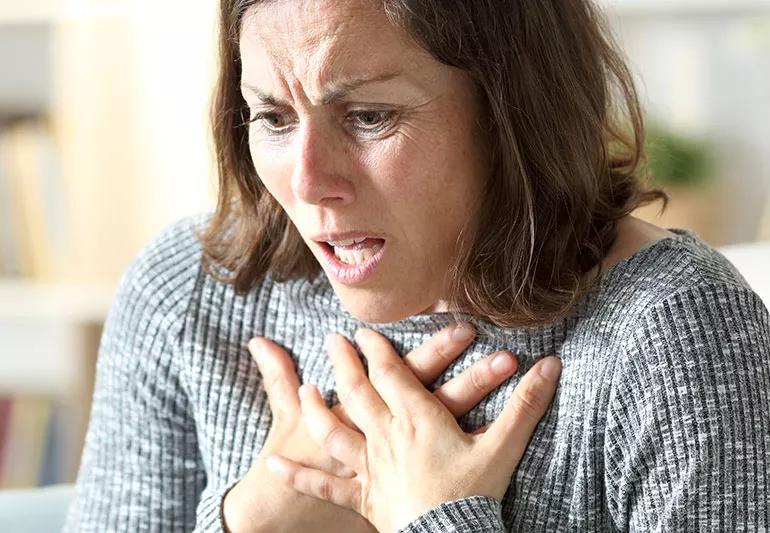Unexpected scares can have powerful effects on your body

Image content: This image is available to view online.
View image online (https://assets.clevelandclinic.org/transform/7e1f440f-beb8-4944-94ff-6016bd8a58f3/scaredHeartPain-1227182872-770x553-1_jpg)
woman frightened with chest pain
We often look forward to scary movies, and we’ll casually talk about being “scared to death” if we’re suddenly surprised or startled.
Advertisement
Cleveland Clinic is a non-profit academic medical center. Advertising on our site helps support our mission. We do not endorse non-Cleveland Clinic products or services. Policy
But want to know the really scary thing? Fear can actually have some extreme physiological effects. It’s rare, but it can happen.
Intense emotion can actually trigger a heart attack in susceptible individuals (especially those suffering from other heart conditions). But even people without an underlying heart problem can literally be scared (almost) to death.
It’s a condition called stress cardiomyopathy, and it’s caused by your brain’s fight-or-flight response occurring after physical or emotional stress.
This is also called broken heart syndrome or Takotsubo cardiomyopathy. Stress-induced cardiomyopathy means stress has caused (most often temporary) dysfunction or failure of the heart muscle.
“The symptoms are similar to those of a heart attack,” according to cardiac surgeon A. Marc Gillinov, MD. “Most people think they’re actually having a heart attack because shortness of breath and chest pain do occur in both. But those with stress cardiomyopathy don’t have blocked coronary arteries and often recover quickly.”
Fear-related stress cardiomyopathy was first recorded in 1990 by Japanese physicians. And while it’s remained somewhat elusive through the years, cases of stress cardiomyopathy have become more commonly diagnosed in the last 10 years or so.
Advertisement
When the body is responding to a sudden frightening, dangerous or stressful situation, it pumps out a lot of extra adrenaline — or catecholamines.
“This surge in hormones causes immediate physiological changes that prepare your body for physical activity — that’s your fight-or-flight response,” Dr. Gillinov says.
This means the brain is telling the body, “We’re either going to need to run fast to get away, or we’re going to fight hard to defend ourselves.” That’s when the adrenaline kicks in.
Some typical physical effects of the adrenaline-infused fight-or-flight responses triggered by our brain when we’re scared are increases in heart rate, blood pressure and blood glucose levels. The general reaction of the sympathetic nervous system that kicks in too is what tells you to flee or fight.
Whether you stay or go, all of this begins to affect the heart’s electrical system. It can cause arrhythmia, constriction of blood vessels (even when there aren’t blockages) or spasms. This is what can cause heart function to decline or fail. In instances when you’re scared, the heart muscle might stop squeezing and not pump blood as efficiently as it needs to.
“Fortunately, in most cases this condition is reversible and the heart function returns to normal over time. Unfortunately, in rare instances, it can cause sudden death,” he says.
“Whether you have heart disease or not, the likelihood of sudden death from a scare is incredibly rare,” Dr. Gillinov points out. “Unfortunately, it’s difficult to predict who is more likely to have such an event. And while we can’t control unexpected incidents that may cause us to be scared, living with limited stress triggers is obviously a good idea in order to avoid the onset of these kinds of sudden heart conditions,” he says.
Advertisement

Sign up for our Health Essentials emails for expert guidance on nutrition, fitness, sleep, skin care and more.
Learn more about our editorial process.
Advertisement
Even small moments of time outdoors can help reduce stress, boost mood and restore a sense of calm
Fill your coping toolbelt with healthy skills like getting outside, writing in a journal, volunteering, laughing or talking with a friend
We all experience some stress from time to time, but chronic stress can contribute to health issues like diabetes and cardiovascular disease
Getting outside, eating a healthy diet, taking up journaling, listening to music — even cuddling a pet — can provide stress relief
Give these 30+ grocery items a try to help find relief
In response to stress or danger, your brain responds by either defending itself, running away, stopping or reconciling
From nausea, weight gain and eczema, stress can affect your immune system in many ways
Stress hormones trigger cravings in an attempt to keep us safe from danger
Prioritize your health by managing stress, strengthening your social connections and getting quality sleep
Bolsters, blankets, pillows and blocks can offer extra support, stability and comfort
Allergies, postnasal drip, asthma or reflux could be to blame for a cough that won’t quit